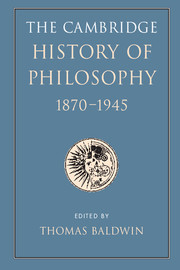Book contents
- Frontmatter
- Contents
- List of contributors
- Introduction
- I 1870–1914
- II 1914–1945
- 8 Logic and philosophy: the analytic programme
- 9 The diversity of philosophy
- 32 The continuing idealist tradition
- 33 Transformations in speculative philosophy
- 34 Realism, naturalism, and pragmatism
- 35 French Catholic philosophy
- 36 Spanish philosophy
- 37 The phenomenological movement
- 38 Heidegger
- 39 Latin american philosophy
- 40 Japanese philosophy
- 10 Knowledge, language, and the end of metaphysics
- 11 Philosophy and the exact sciences
- 12 Mind and its place in nature
- 13 Philosophy and social science
- 14 Ethics, religion, and the arts
- 15 Law and politics
- Biobibliographical appendix
- Bibliography
- INDEX
- References
33 - Transformations in speculative philosophy
from 9 - The diversity of philosophy
Published online by Cambridge University Press: 28 March 2008
- Frontmatter
- Contents
- List of contributors
- Introduction
- I 1870–1914
- II 1914–1945
- 8 Logic and philosophy: the analytic programme
- 9 The diversity of philosophy
- 32 The continuing idealist tradition
- 33 Transformations in speculative philosophy
- 34 Realism, naturalism, and pragmatism
- 35 French Catholic philosophy
- 36 Spanish philosophy
- 37 The phenomenological movement
- 38 Heidegger
- 39 Latin american philosophy
- 40 Japanese philosophy
- 10 Knowledge, language, and the end of metaphysics
- 11 Philosophy and the exact sciences
- 12 Mind and its place in nature
- 13 Philosophy and social science
- 14 Ethics, religion, and the arts
- 15 Law and politics
- Biobibliographical appendix
- Bibliography
- INDEX
- References
Summary
EXISTENCE
Existence, like tea, can be taken strong or weak. Speculative philosophy characteristically defends a strong theory of existence, while other kinds of philosophy strenuously defend a weak theory. So fundamental is the difference between strong and weak theories of existence to any account we give of the nature of things that the debate between them lies at the very heart of philosophy.
Admittedly, weak theorists would regard such a claim as contentious, for weak theorists characteristically understand existence in terms of the analysis which Frege developed in the 1880s: statements of the type ‘horses exist’ are interpreted as quantificational statements to the effect that ‘for some x, x is a horse’. On this view, existence amounts to no more than the satisfaction or instantiation of a predicate, such as ‘ … is a horse’. To exist is to answer a description. Whether one is talking about prime numbers, stones, or people, existence statements are defined in the same way, as saying that something satisfies a description. The weak theory of existence is thus not properly a theory of existence at all. Existence is simply removed from the realm of reflection and replaced by an account of the logical structure of language. Yet such claims do not impress strong theorists, the speculative philosophers, for speculative philosophy holds that existence is more than the silent, featureless pendant of the ‘existential’ quantifier (‘for some x’). The ‘is’ of existence is not to be reduced to the ‘is’ of instantiation.
- Type
- Chapter
- Information
- The Cambridge History of Philosophy 1870–1945 , pp. 438 - 448Publisher: Cambridge University PressPrint publication year: 2003



